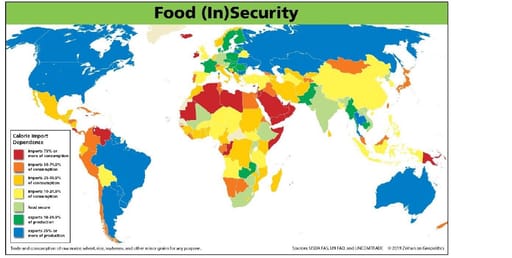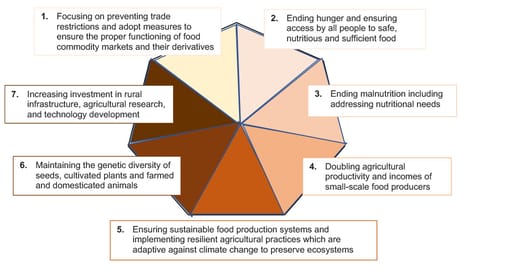Food security and Covid-19: averting a crisis of “biblical proportions”
04 May 2020
The fields are full, but the plates are empty. We look at food security in South Africa.
10 min read
Get Focus insights straight to your inbox
For many of us, food is at the centre of our happiest moments. Whether it’s a meal spent with family, a celebratory dinner, a brunch with friends or the culinary pleasure of preparing lunch for a loved one, food is a joy of life.
Many people are denied these moments of joy, however. In a report issued on 23 March last year, the Food and Agriculture Organisation of the United Nations (FAO) and the World Food Programme (WFP) warned of an unprecedented food security crisis in more than 20 countries across the globe. Today, more than 820 million people regularly go to bed hungry, of whom 135 million suffer from acute hunger largely due to man-made conflicts, climate change and economic downturns. High costs and low affordability also mean billions cannot eat healthily or nutritiously.
Today, more than 820 million people regularly go to bed hungry, of whom 135 million suffer from acute hunger largely due to man-made conflicts.
The Covid-19 pandemic further stressed food security levels, with an estimated additional 130 million people placed at risk of suffering acute hunger at the end of 2020, according to the World Food Programme. With more than a quarter of a billion people potentially on the brink of starvation, swift action needs to be taken to provide food and humanitarian relief where the need is greatest. At the same time, a profound change to the global food and agriculture system is needed if we are to nourish the 820 million (and growing) people who are hungry, as well as the additional 2 billion people the world will have by 2050. Increasing agricultural productivity and ensuring sustainable food production are crucial to help alleviate the perils of hunger.
The war in the Ukraine, which began in February, has placed in sharp focus the possibility of food shortages across the globe due to the high proportion of wheat and corn produced by the Ukraine and Russia (both countries account for an estimated 10% of global calorie exports, mostly in the form of wheat and corn). The chart below, taken from a recent UN FAO report, shows how sensitive the world is to the disruptions caused by Russia/Ukraine to global calorie flows. Countries in Africa and South East Asia are especially at risk.

Changing weather patterns, the Covid-19 pandemic, geopolitical risks and conflicts, as well as potential changes in trade agreements, all contribute to the urgency of food security as a key priority in achieving a sustainable future. The targets underlying the second United Nations Sustainable Development Goal (SDG) – Zero Hunger are illustrated below and include seven key areas of interest which need focus and funding to address food security globally.

Source: United Nations Food and Agriculture Organisation and the World Food Programme, March 2021
In South Africa, the challenges around food security extend from capacity to access. Without adequate sustenance, our communities will remain stuck in the cycle of poverty, children will not be able to gain a quality education and adults will not be able to work and earn an income.
The importance of nourishment for our health and wellbeing cannot be stressed enough. Stunting, which affects around 149 million children worldwide, refers to the impaired growth and development of children and is largely caused by poor nutrition leading to compromised immunity and other illnesses. Around 45% of deaths among children under five years of age are linked to undernutrition, with many children receiving their only meal each day while attending school. It’s at this intersection of quality education and food security.
Agriculture is an important part of our economy and perhaps provides an area of opportunity to address many of the targets within SDG 2. Agriculture is the single largest employer, providing livelihoods for 40% of today’s global population and is the largest source of income and jobs for rural households.
If we think holistically about high unemployment rates, our rich natural resources and the need for sustainable food systems, we can then recognise the myriad of opportunities that exist if we put SDG 2 at the epicenter: from economic growth to reducing poverty and inequality.
Examples of this include urban farming solutions, community food gardens, support for small-scale farmers through skills development, regenerative agricultural practices, as well as investment in research, infrastructure and technology. All of these can enable sustainable food production systems.
Globally, one in nine people in the world today is undernourished. Simultaneously, at least 1.3 billion tonnes – enough to feed the estimated 820 million people who go hungry each day – is either lost or wasted each year. With most of the world’s hungry living in developing countries where around 13% of the population is undernourished, we have a collective responsibility to act. Through the questions we ask, the choices we make and the food we eat, we can plant seeds today that will feed generations to come.

As Sustainability is core to our fundamental investment approach, we have integrated ESG considerations into our investment decision making and broader investment process.